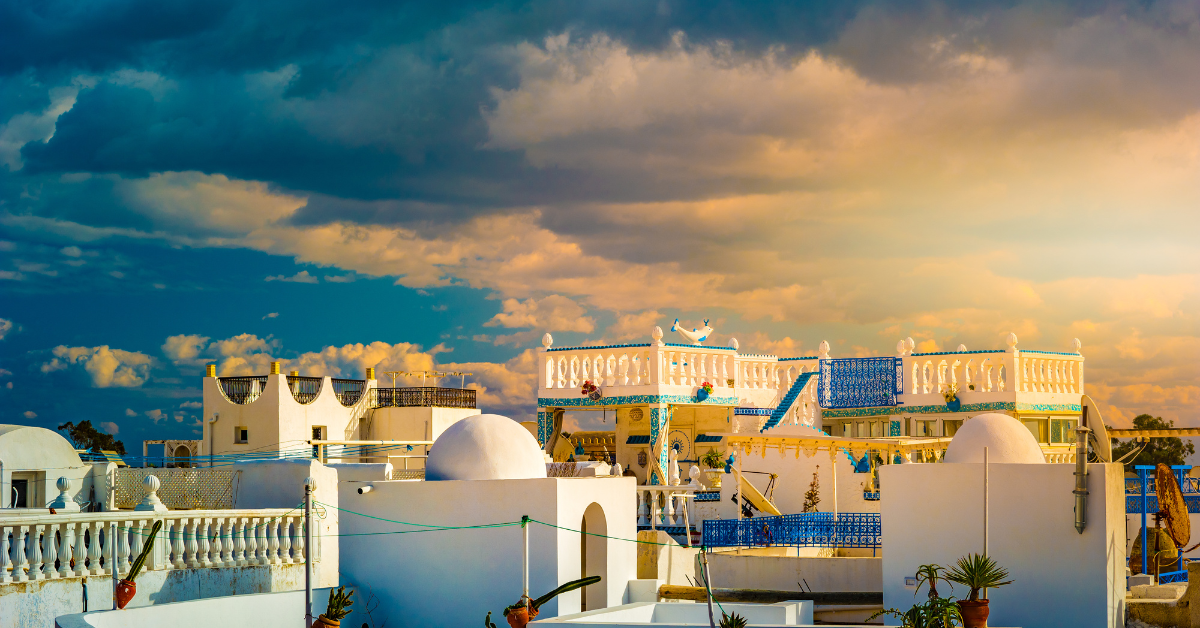Tunisia, located in North Africa, is a country where the Mediterranean Sea meets the Sahara Desert. In Chinese characters, it is written as “突尼斯,” a transcription of the capital Tunis. For many Japanese, Tunisia is associated with exotic landscapes, ancient ruins, and passionate sports culture. This article explores both the meaning behind the Chinese character notation and the images Japanese people hold of Tunisia.
The Chinese Character Notation of Tunisia “突尼斯”
Origin of the Notation
The capital of Tunisia is called “Tunis.” Based on this sound, it was transcribed into Chinese as “突尼斯”, which later came to be used in Japan as well. When transcribing foreign place names into Chinese characters, the sound is prioritized over meaning. For example, America becomes “美国,” France becomes “法国,” and Tunisia follows the same logic.
Impression in Japanese
Japanese people rarely use “突尼斯” in everyday life, but the characters themselves give off an impression of strength and exoticism. “突” conveys force, “尼” adds softness, and “斯” provides an archaic touch. Combined, the characters evoke a uniquely foreign atmosphere.
Japanese Perceptions of Tunisian Tourism
Mediterranean Streets
The white and blue townscapes are viewed by Japanese as a symbol of “Mediterranean beauty.” Especially Sidi Bou Said enjoys great popularity among travelers, leaving a lasting impression.
The Charm of the Sahara Desert
Another face of Tunisia is the Sahara Desert. Caravan tours and desert camping offer extraordinary experiences, providing Japanese visitors with unique adventures. Moreover, it is famous as a filming location of “Star Wars,” making it a dream destination for movie fans.
Characteristics of Tunisian Tourism
| Feature | Description | Japanese Impression |
|---|---|---|
| Mediterranean streets | White and blue scenery | Strong exotic appeal, picturesque |
| Sahara Desert | Caravan and camping | Adventurous, extraordinary experiences |
| Movie sites | Star Wars filming location | A pilgrimage site for fans |
The Image of History and Culture
Ancient Carthage and Roman Ruins
Tunisia was a major hub of ancient civilizations. Sites like the ruins of Carthage and Roman amphitheaters are prime examples, attracting strong interest from history enthusiasts and archaeology fans in Japan.
Cultural Fusion
Islamic culture blends with Mediterranean influences, which is evident in food and music. For Japanese people, Tunisia represents a unique charm that combines the discipline of Arab culture with the openness of the Mediterranean.
Historical and Cultural Appeal
| Field | Example | Japanese Impression |
|---|---|---|
| Ancient ruins | Carthage, Roman amphitheaters | Grand, historically valuable |
| Architecture | Islamic and Mediterranean styles | Beautiful fusion, exotic charm |
| Arts | Mosaics, music | Colorful and distinctive |
Tunisia Through Sports
A Country of Soccer
In Tunisia, soccer is the most popular sport. With multiple World Cup appearances, the country is familiar to Japanese soccer fans through international matches. Stadiums are filled with passionate supporters, making soccer a stage that symbolizes national pride.
Olympics and Individual Sports
Beyond soccer, Tunisia has produced world-class athletes in swimming and athletics. The country has even produced Olympic medalists in swimming, giving it international recognition in the sports world.
Tunisian Sports
| Sport | Achievements | Japanese Impression |
|---|---|---|
| Soccer | Multiple World Cup appearances | A passionate national sport |
| Swimming | Olympic medalists | Known internationally for strong athletes |
| Athletics | Top finishes in global events | Youthful energy and vitality |
Japanese Perceptions of Tunisian Life and People
Calmness and Energy
The warm climate supports a lifestyle seen by Japanese as “peaceful and laid-back.” At the same time, marketplaces and street corners are full of vitality, where people interact socially and welcome visitors warmly.
Exoticism and Distance
Because of its strong Islamic cultural influence, Tunisia can still appear as a “distant, foreign world” to Japanese people. However, with increasing tourism and educational exchanges, Tunisia is gradually turning into a “familiar and approachable country.”
Conclusion
The Chinese character notation of Tunisia, “突尼斯,” is based on the sound of Tunis. Though rarely used in Japanese, it carries an exotic and powerful resonance. For Japanese people, Tunisia is a land of beauty—white and blue Mediterranean towns, the Sahara Desert, and ancient ruins. At the same time, it is also recognized internationally as a sports nation, known for soccer and Olympic athletes.
Through its history, culture, sports, and daily life, Tunisia presents many different faces. Moving forward, it is expected to become even more familiar to Japanese people—not only as a travel destination but also as a place of cultural exchange and learning.






